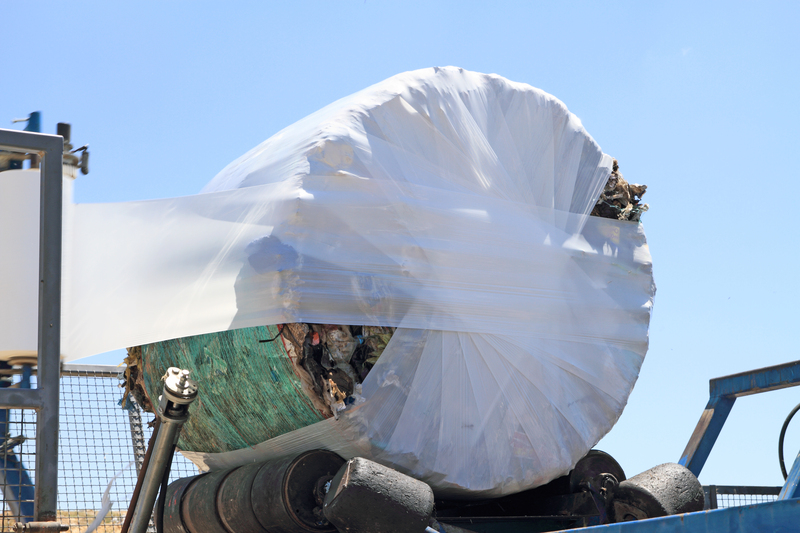Effective Strategies for Reducing Plastic Waste Daily
Posted on 18/06/2025
Effective Strategies for Reducing Plastic Waste Daily
Plastic waste has become one of the most significant environmental challenges facing the world today. From overflowing landfills to polluted oceans, single-use plastics and excessive packaging threaten wildlife, natural habitats, and even human health. As awareness grows, more people seek practical, everyday solutions that minimize their plastic footprint. In this comprehensive guide, you'll discover a variety of effective strategies for reducing plastic waste daily. These tips and lifestyle changes not only help the planet but often lead to a healthier, simpler life.
Why Reducing Plastic Waste Matters
Before diving into the strategies, understanding why it's crucial to cut down on plastic usage provides motivation and clarity. Plastic pollution can take hundreds of years to decompose, leaching toxins into soil and water while breaking down into microplastics that enter the food chain. Everyday actions may seem small, but collectively, they have a significant impact.
- Environmental Protection: Reducing plastic use safeguards marine and terrestrial ecosystems.
- Wildlife Conservation: Animals are less likely to ingest or become entangled in plastic waste.
- Human Health: Decreasing microplastics lowers exposure to potentially harmful chemicals.
- Resource Conservation: Less plastic means less demand for fossil fuels used in production.

How to Reduce Plastic Waste in Your Daily Routine
The challenge of minimizing plastic waste can feel overwhelming, but it becomes manageable when broken into simple, daily steps. Here are actionable tips and techniques that empower you to make a difference at home, work, and on the go.
1. Embrace Reusable Alternatives
Single-use plastics such as shopping bags, water bottles, and cutlery contribute enormously to global waste. By switching to reusable options, you can significantly cut your daily plastic consumption.
- Bring Your Own Bags: Use sturdy canvas or cotton tote bags for shopping instead of plastic bags.
- Opt for Refillable Water Bottles: Choose stainless steel, glass, or BPA-free reusable water bottles.
- Use Reusable Containers: Pack lunches in glass or metal containers rather than disposable plastic ones.
- Carry Reusable Cutlery: A portable set of cutlery (bamboo, stainless steel) eliminates the need for plastic forks and spoons.
- Favor Fabric Produce Bags: Replace thin plastic produce bags with washable mesh alternatives.
Tip: Create a "zero waste kit" for your backpack or car so you always have reusable items on hand!
2. Reduce Plastic Packaging at the Source
Packaging makes up a substantial portion of the plastic pollution problem. By making conscious purchasing choices, you can send a strong market signal to producers.
- Buy in Bulk: Choose bulk bins for grains, legumes, and snacks. Bring your own containers if allowed.
- Select Products with Minimal Packaging: Shop for items boxed in paper, glass, or metal over plastic whenever possible.
- Support Package-Free Stores: Look for zero-waste shops in your area that encourage customers to bring refillable containers.
- Opt for Fresh Produce: Choose unpackaged fruits and vegetables instead of pre-wrapped alternatives.
- Avoid Single-Serve Packages: Buy larger sizes and portion at home to reduce overall packaging waste.
Fun Fact: Many supermarkets now offer "bring-your-own-container" programs at deli counters!
3. Choose Alternatives to Common Household Plastics
In every room of your home, there are opportunities to swap out plastics for more sustainable materials. Effective strategies for reducing plastic waste daily begin with assessing your current habits and making conscious replacement choices.
- Kitchen: Switch from plastic wrap to beeswax wraps, reusable silicone pouches, or glass containers with lids.
- Bathroom: Try bamboo toothbrushes, bar soap, shampoo bars, and toothpaste tablets instead of plastic tubes.
- Cleaning Supplies: Use refillable bottles and make homemade cleaners. Buy powders or concentrates that come in cardboard boxes or glass bottles.
- Laundry: Choose detergent sheets or powders in cardboard rather than plastic jugs. Consider wool dryer balls instead of dryer sheets.
4. Rethink and Reduce at the Office or School
Workplaces and schools often rely on convenience items that lead to unnecessary plastic waste. Here's how to create a more sustainable routine:
- Bring Reusable Mugs and Bottles: Use your own cup for coffee or tea and a refillable water bottle.
- Print Only When Necessary: Minimize plastic-laminated paper and seek digital alternatives for documents and presentations.
- Store Snacks Sustainably: Transfer snacks to reusable or biodegradable containers instead of baggies.
- Promote a Plastic-Free Lunch: Encourage coworkers and classmates to bring meals in reusable containers and wrap foods in cloth.
Small changes at your office or school can inspire others to join your efforts!
5. Support Plastic-Free Brands and Initiatives
As consumers, your choices influence what companies produce. By supporting brands that prioritize plastic reduction, you help drive industry-wide change.
- Choose Companies with Eco-Friendly Packaging: Buy from businesses that offer compostable, recyclable, or reusable packaging.
- Look for Certification Labels: Seek products certified as "Plastic-Free," "Compostable," or "Zero Waste."
- Participate in Take-Back Programs: Some brands collect and recycle their own packaging, providing drop-off or mail-in options.
- Advocate for Change: Request retailers switch to more sustainable packaging or join campaigns demanding corporate responsibility regarding plastic pollution.
6. Properly Sort and Recycle Plastic Waste
While reducing and reusing should come before recycling, responsible recycling ensures that less plastic ends up in the landfill or the ocean.
- Know Your Local Rules: Recycling guidelines vary widely. Learn which plastics your community accepts.
- Clean Before Recycling: Rinse containers to help ensure they are actually recycled.
- Avoid "Wishcycling": Don't recycle items that are not accepted--this can contaminate whole batches and send them to the landfill.
- Seek Out Specialty Recyclers: Electronics, plastic bags, and some hard-to-recycle plastics can often be dropped at special collection sites.
Tip: Keep a recycling cheat sheet above your bin to remind everyone in your household of the rules!
7. Get Involved in Community Plastic Waste Reduction
Individual action is powerful, but collective action creates exponential change. Join forces with your community to tackle plastic waste problems together.
- Organize Cleanups: Join or start local litter-picking or beach-cleaning groups to directly remove waste from the environment.
- Educate and Empower: Offer workshops or presentations to schools, workplaces, or community centers on plastic reduction.
- Engage Local Government: Advocate for bans on single-use plastics or improved recycling and waste management systems.
- Share Your Journey: Use social media to inspire others with your progress and tips for reducing plastic daily.
8. Develop DIY Alternatives for Everyday Plastics
Many effective strategies for cutting down on plastic waste involve a little creativity or going back to basics.
- Homemade Cleaning Sprays: Use vinegar, baking soda, and essential oils in glass spray bottles.
- DIY Food Wraps: Create your own beeswax wraps with fabric and beeswax.
- Handmade Soaps and Lotions: Reduce packaging by making your own skincare products using natural ingredients and refillable containers.
- Make Your Own Snacks: Baking granola bars or chips at home prevents the purchase of individually wrapped snacks.
Addressing Common Challenges in Reducing Plastic Waste
It's important to acknowledge that moving towards a plastic-free lifestyle isn't without its challenges. However, preparation and persistence can make the transition smoother.
- Higher Upfront Costs: While eco-friendly products may cost more initially, they last longer and save money over time.
- Availability: Rural or small-town areas may have fewer zero-waste stores; online orders and bulk-buying can help.
- Social Settings: It can be challenging in restaurants or group events; bring your own containers or politely request no plastic.
- Forming New Habits: Building a routine for bringing your reusable bag or cup takes time and reminders.
Remember: You don't have to be perfect. Every small change contributes to the solution!
Benefits of Reducing Plastic Waste in Your Life
Adopting plastic waste reduction strategies provides far-reaching advantages, impacting more than just the environment.
- Healthier Lifestyle: Embracing fewer plastic products reduces exposure to chemicals linked to health risks.
- Financial Savings: Reusable products and homemade alternatives decrease recurring expenses.
- Decluttered Spaces: Less packaging and disposables mean tidier homes and offices.
- Community Inspiration: Your actions can spark wider change by inspiring friends, coworkers, and neighbors.
- Pride and Purpose: Living in line with your values feels rewarding and meaningful.

Frequently Asked Questions: Plastic Waste Reduction
Is it possible to completely eliminate plastic waste from daily life?
Complete elimination of plastic is extremely challenging due to its prevalence in packaging, textiles, and electronics. However, significant reduction is possible by adopting the strategies listed above and advocating for systemic change.
What are the main alternatives to plastic bags?
Cloth tote bags (cotton or jute), canvas baskets, and even woven baskets are sturdy, long-lasting replacements for plastic shopping bags.
How can I encourage others to reduce their plastic waste?
Lead by example, share resources and tips, participate in or organize community cleanups, and support educational initiatives in schools and workplaces.
Are biodegradable plastics a good solution?
While they break down more quickly than conventional plastics, many require industrial composting facilities unavailable in some regions, and can still contribute to pollution if not disposed of properly.
Conclusion: Every Action Counts in Reducing Plastic Waste
Reducing plastic waste daily isn't just a trend--it's a necessity for a more sustainable, healthy planet. By using innovative, practical strategies like those detailed in this article, anyone can make conscious choices towards a cleaner environment. Begin with small changes, inspire your community, and remember that together, everyone's efforts add up to a major impact. Start today's habit of cutting plastic waste--the earth will thank you!
Take Action Now: Your First Step Towards a Plastic-Free Lifestyle
Which strategy will you put into action today? Whether it's swapping plastic bags for reusable totes or supporting local zero-waste stores, every step makes a difference. The journey to reduce single-use plastics starts with your next decision.
Latest Posts
Explore options to properly recycle old phone chargers
Prioritize Safety: The Plastics to Avoid in Your Home
Engaging Students in Sustainable Recycling Practices at School
From Closet Castaways to Fashion Finds: Recycling Old Apparel

